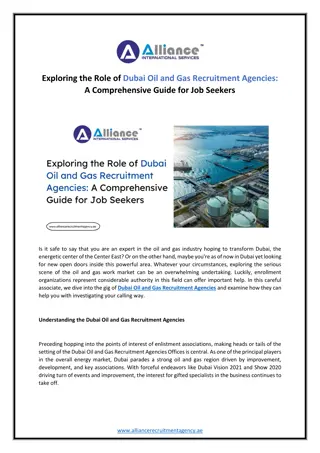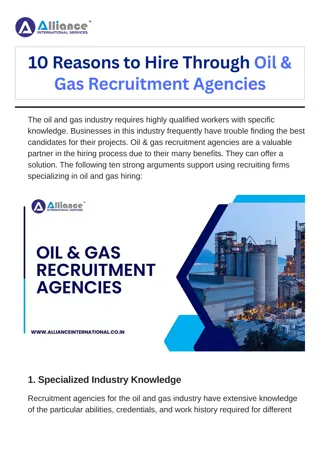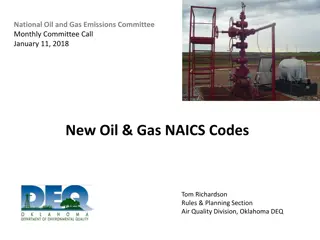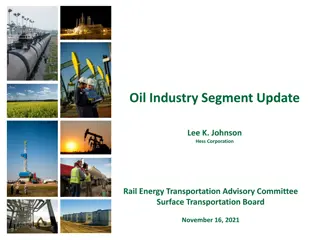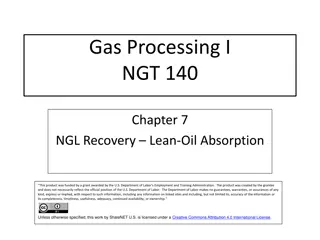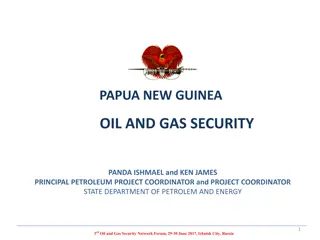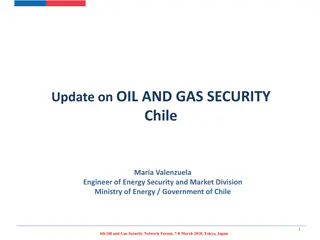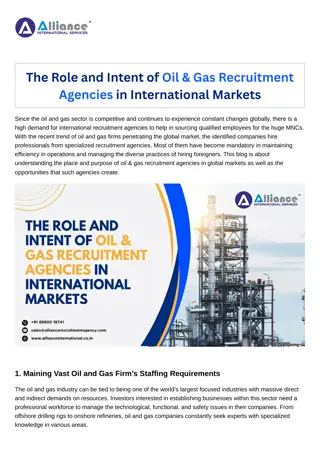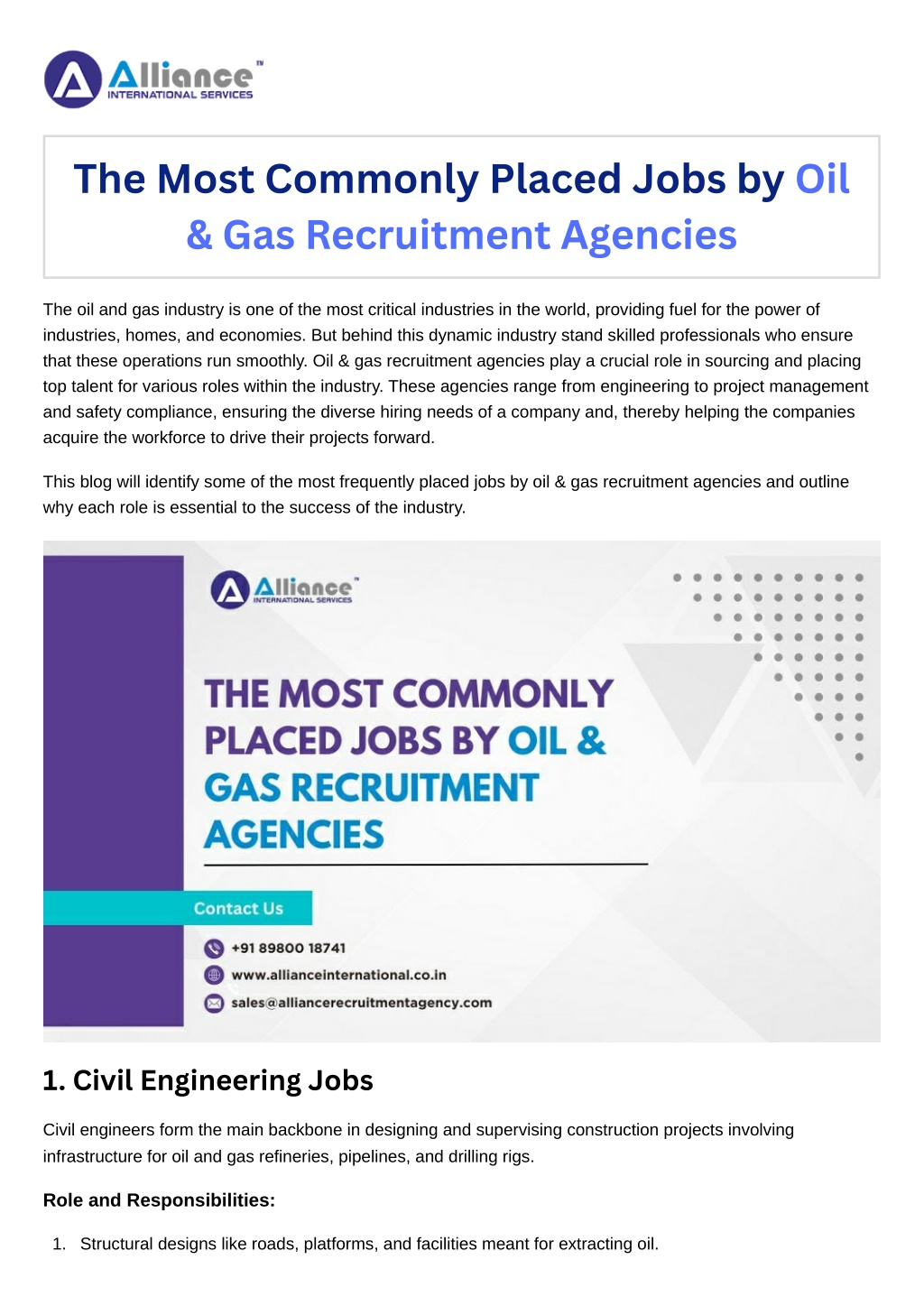
The Most Commonly Placed Jobs by Oil & Gas Recruitment Agencies
Explore the top jobs placed by leading oil & gas recruitment agencies, including roles in civil engineering, mechanical engineering, project management, HSE, and more. Find your next opportunity in the oil and gas sector! For more information, visit:
Download Presentation

Please find below an Image/Link to download the presentation.
The content on the website is provided AS IS for your information and personal use only. It may not be sold, licensed, or shared on other websites without obtaining consent from the author. Download presentation by click this link. If you encounter any issues during the download, it is possible that the publisher has removed the file from their server.
E N D
Presentation Transcript
The Most Commonly Placed Jobs by Oil & Gas Recruitment Agencies The oil and gas industry is one of the most critical industries in the world, providing fuel for the power of industries, homes, and economies. But behind this dynamic industry stand skilled professionals who ensure that these operations run smoothly. Oil & gas recruitment agencies play a crucial role in sourcing and placing top talent for various roles within the industry. These agencies range from engineering to project management and safety compliance, ensuring the diverse hiring needs of a company and, thereby helping the companies acquire the workforce to drive their projects forward. This blog will identify some of the most frequently placed jobs by oil & gas recruitment agencies and outline why each role is essential to the success of the industry. 1. Civil Engineering Jobs Civil engineers form the main backbone in designing and supervising construction projects involving infrastructure for oil and gas refineries, pipelines, and drilling rigs. Role and Responsibilities: 1. Structural designs like roads, platforms, and facilities meant for extracting oil.
2. Monitor construction and maintenance of important infrastructures. 3. Ensure structures are up to the mark, meeting all requirements of safety, quality, and the environment. Why It Matters: Without a pool of professional civil engineers, there would be insufficient or unsafe infrastructural support for exploration, production, and distribution. The recruiters from oil & gas recruitment agencies need skilled civil engineers actively being searched for as candidates working with experience in industrial large-scale projects. 2. Mechanical Engineering Jobs Mechanical engineers design, assemble, and maintain the heavy machinery and equipment used in the process of extracting oil, refining, and transportation. Role and Responsibilities: 1. Designing equipment, such as compressors, pumps, turbines, and drilling machines. 2. Maintenance and inspection to prevent breaks. 3. Troubleshooting breakdowns in mechanical systems while optimizing equipment usage. Why It Is Important: It is through mechanical engineering that the machinery in an oil and gas industry can be maintained operating. Mechanical engineers ensure proper functionality of machinery, thus reducing downtime, as well as increasing output. 3. Electrical Engineering Jobs Electrical engineers play a crucial role in the designing and maintenance of electrical systems critical to oil and gas operations, both onshore and offshore. Role and Responsibilities: 1. Power systems design and electrical grid development as well as automation system development 2. Power supply management for drilling rigs, refineries, and processing plants. 3. Inspection, safety audits, and electrical systems maintenance and repair to guarantee continuous power supply. Why it is important: Power failures can be very expensive, but for the electrical engineers, oil and gas operations would have continued and safe operation in place for maximum performance. 4. Project Controls Jobs The project controls professionals manage the management of budget, schedules, and progress to ensure that the oil and gas projects will be delivered within the specified time and budget. Role and Responsibilities: 1. Monitoring the progression of the project and managing its timelines.
2. Controlling costs, resources, and budgets in the project. 3. Identifying risk factors and implementing strategies against delay. Why It Matters: Large oil and gas projects have huge investments and very tight timelines. Project control professionals ensure that the projects stay on course, and this makes stakeholders successful. 5. Project Management Jobs Project managers oversee large-scale projects in exploration, drilling, production, and construction. Role and Responsibilities: 1. Manages teams, schedules, and budgets. 2. Safety and regulatory compliance. 3. Coordinate stakeholder engagements to achieve project milestones. Why It Matters: Project management is leadership that delivers large, complex projects. In the process of recruiting candidates, oil & gas recruitment agencies seek a candidate who has experience in managing large teams. 6. Construction Jobs Construction jobs are required for constructing the physical infrastructure of the oil and gas industry, such as pipelines, platforms, and refineries. Role and Responsibilities: Management of site preparation and infrastructure installation. Management of construction teams and safety protocols. Quality checking on whether the designed structure does meet all requirements Why It Matters: A fast, safe, and time-efficient way of constructing projects that experienced construction experts can deliver assures oil and gas firms that such firms can operate their businesses efficiently. 7. Piping Engineering Jobs Piping engineers design pipeline systems and specifications with support structures for facilitating the transportation of oil and gas as well as other related materials within facilities. Role and Responsibilities: 1. Pipeline layout, specifications, and support structures design. 2. All systems must be corrosion-resistant and leak-proof. 3. Coordinate with other engineering teams on the integration of piping systems effectively. Why It Matters:
A pipeline network is the lifeblood of oil and gas transport. Piping engineers guarantee their reliability, safety, and efficiency. 8. Pipe Stress Jobs Pipe stress engineers do stress analysis to be able to manage the level of stress in piping systems for strength and safety code compliance. Role and Responsibilities: 1. Conducting stress analysis to prevent pipeline failures. 2. Identification of risk and recommending design modifications. 3. Compliance with industry safety standards and codes. Why It Matters: High pipeline stress can lead to failure or accidents. Pipe stress engineers ensure pipelines are designed to operate with pressure and environmental conditions. 9. Process Engineering Jobs Process engineers design, optimize, and manage processes for the refining of oil, gas, and petrochemical products. Role and Responsibilities: 1. Designing process designs for refineries and processing plants. 2. Process improvements to increase efficiency and reduce costs 3. Safety measures to avoid hazards. Why It Matters: Effective processing is crucial to achieve maximum output and profit. Process engineers ensure that operations are efficient, safe, and sustainable. 10. Health, Safety & Environmental Jobs HSE professionals focus on implementing safety measures, environmental standards, and health protocols to protect workers and the environment. Role and Responsibilities: 1. Safety audits and training programs. 2. Compliance with environmental regulations. 3. Risk reduction in personnel and environment. Why It Matters: The oil and gas business is inherently hazardous. HSE professionals create a healthy environment at work and statutory compliance results in fewer accidents in workplaces.
11. Structural Engineering Careers Structural engineers conceive and assess the structural robustness of structures such as off-shore platforms, rigs and support systems to ensure stability and safety. Responsibilities 1. Structural design of load-bearing structures that resist environmental pressure. 2. Inspect and maintain to determine structural integrity. 3. Work with construction and piping crews. Why It Matters: Oil and gas operations in hostile environments require reliable structures. Structural engineers ensure that such structures are robust, stable, and safe. 12. Document Control Jobs They control and coordinate project critical documents so that communication is effective and follows the industry s required standards. Role and Responsibilities: 1. Ensure the accuracy and completeness of project documents. 2. Ensure documents are meeting the requirements of regulations and contracts. 3. Coordinate sharing and archiving of documents. Why it Matters: Document controllers are important in ensuring information is accessible, accurate, and secure. Their work is important in supporting project transparency and compliance. Conclusion It would take a very broad category of professionals to make sure everything goes right with its operations in the oil and gas industry. There is everything from engineering and project management to construction, including safety compliance. It s possible to find them in the recruitment agencies for oil & gas. Alliance International is one of the top companies that specialize in recruitment and hiring the best talent available in the oil and gas sector. They have the experience and capability to ensure finding the most competent staff for the work of projects, so they lead to smooth running. Whether it is a need for civil engineering, mechanical engineering, HSE, or something else, we can assist you in providing the right candidate in time and according to your expectations. Contact us today to meet your recruitment needs and build a solid team for your oil and gas projects. View source: https://itrecruitmentagency.tech.blog/2024/12/17/the-most-commonly-placed-jobs-by-oil- gas-recruitment-agencies/.
sales@alliancerecruitmentagency.com www.allianceinternational.co.in




